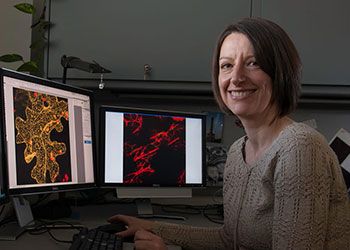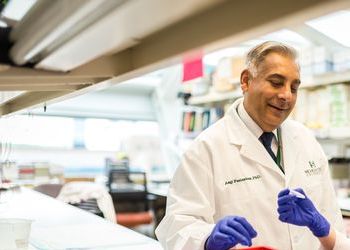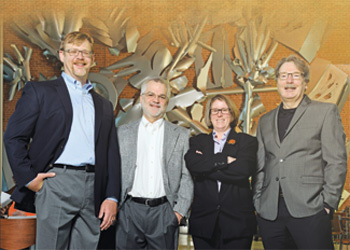Endowed Chair Factors Into a Nonlinear Path
“There’s an immediate payoff when you stand in front of a class, convey something complicated in just the right way, and suddenly see that the students understand.”
Endowed Chair Factors Into a Nonlinear Path
“There’s an immediate payoff when you stand in front of a class, convey something complicated in just the right way, and suddenly see that the students understand.”
April 20, 2015“I never envisioned myself at a big, Midwestern university,” Dr. Tim Vogelsang says as he leans back in his chair and looks out the window of his sun-filled office, where he can see the rooftops of the historic red brick buildings that line MSU’s Circle Drive. And why would he? With a bachelor’s degree in math from MIT, a doctorate in economics from Princeton, and a gig as a tenured professor at Cornell, the East Coast was treating him just fine. He was happy where he was. But now? He’s thrilled with where he is.
Professor Vogelsang specializes in econometrics, a field that sits at the intersection of economics, mathematics and statistics. He is a researcher and a leader in his discipline and his list of publications, papers and presentations on the subject is long.
Most importantly, he is a teacher. His students will tell you he’s extremely smart, has the ability to explain any concept, both mathematically and verbally, and isn’t afraid to inject his lectures with humor if the audience starts to look overwhelmed. Those same students contact him years after they graduate, just to tell him that a concept he taught them cropped up in their career or their research and made them think of him.
He got the call from Michigan State in 2006 because he was exactly the kind of faculty member Fred Addy had in mind when he created the Frederick S. Addy Distinguished Chair in Economics.
Funding…for empirical reasons
Fred Addy is an MSU alumnus (’53, ’57 Business) who started working his way up the corporate ladder at Amoco Corporation in 1957 and didn’t stop until he was appointed executive vice president and chief financial officer in 1990, before retiring in 1994.
Through many generous estate gifts and outright contributions, Fred and his wife Marilyn (’53, Music) have become loyal, enthusiastic supporters of their alma mater, and they know that their gifts to MSU are making a visible, lasting difference.
They’re particularly fond of watching their generosity at work in the form of endowed faculty positions. “It’s a direct impact,” Fred says. “We give the money, the chair is established, and we can see exactly what has happened...we’re pleased.”
The economics of an endowment
Endowed positions, like the ones the Addys created in finance and economics, have a ripple effect. Good professors attract good graduate students, and a community of such talented people creates a strong department.
Thanks to Fred and Marilyn’s belief that undergraduate students should also have access to high-quality faculty members, the ripple effect doesn’t stop there. Their endowments have helped bring these professors—and all of their knowledge and experience—to the chalkboard in undergraduate classes, too.
As the economics department’s first-ever endowed faculty chair, Professor Vogelsang has been so successful in making the Addys’ vision for a strong, competitive program a reality that they recently decided to fund a second endowed chair for the department.
Production, distribution and consumption of knowledge
Once a year, the Addys and the Vogelsangs meet at the Kellogg Center State Room to catch up over a bottle of wine. “The first time we met, we really clicked on a personal level,” Vogelsang says of the initial meeting that led to their friendship. “He’s become almost like an uncle to me, and it’s very satisfying to know that he is able to see the work I’m doing.”
Professors like Vogelsang, who are heavily involved in research and who also teach graduate courses, don’t often teach undergraduate classes, but fulfilling the Addys’ desire to give at least one undergraduate class per year the opportunity to learn from an extremely smart, highly specialized professor, is something Vogelsang is proud to do. “When the Economics Department was recruiting for the first Addy Chair—and when we recruit for the next Addy Chair in Economics—a priority was finding someone who genuinely fulfills that undergraduate teaching requirement. And, honestly, I like teaching undergrads,” he says.
It’s clear from the way he talks about his classes, though, that Vogelsang likes teaching, period. “There’s an immediate payoff when you stand in front of a class, convey something complicated in just the right way, and suddenly see that the students understand.”
Every other year, he adds another layer to the impact of the endowment, which he fondly refers to as “the Addy money,” by using a portion of it to help graduate students. “One of the most rewarding things I get to do with it is fund students. Every other year or so, I’m able to fund a graduate student in their fourth year so they can really dig into their work and their research and not worry about where the funding will come from.”
Outside the classroom, Vogelsang uses the Addys’ support the same way. The endowment has given him the freedom to pursue his research, publish his work, and attend international conferences as he sees fit, with few constraints—something he may not have been able to at a university that doesn’t put such vast resources behind its endowed chair positions.
For Vogelsang, the move to this Midwest giant proved to be exactly right. “Good things are happening in economics here,” Vogelsang says. If you ask Fred Addy, he’ll tell you that Vogelsang is one of those good things. “If you’ve never looked up Tim Vogelsang on the Internet, you should. Students think he’s spectacular. They maintain he’s the toughest professor they’ve ever had, but he’s also one of the best at Michigan State.”
For more information on supporting the College of Social Science, contact Senior Director of Development Nick McLaren at mclarenn@msu.edu, or by calling (517) 884-2189.
Author: Devon Barrett




